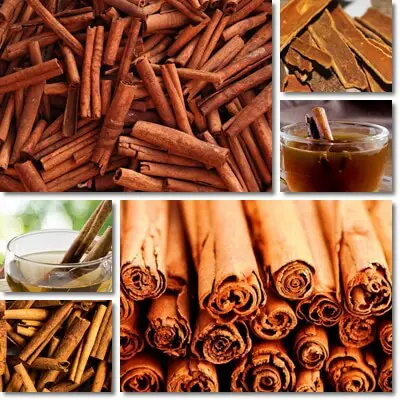Cinnamon tea is a healthy tea, full of benefits for health, and a customary winter holiday beverage. Cinnamon carries the smell of Christmas, coordinating perfectly with the flavor theme of the holiday season, and tea made from ground cinnamon or steeped cinnamon bark is especially good for you. Cinnamon tea exhibits antioxidant, anti-inflammatory, antibacterial and antiviral effects, and lowers high blood pressure numbers and blood sugar levels. Compounds occurring naturally in the tea exert a protective effect against gastritis and gastric ulcers, with minimal side effects and toxicity.
What is cinnamon?
Cinnamon is essentially tree bark. It is the inner bark of several trees in the Cinnamomum genus. There are actually about 250-300 different tree species in the Cinnamomum genus, but not all are sources of the spice known as cinnamon. The bark of some species of cinnamon is used to make insect repellents and insecticides, anti-flea products, to extract camphor used to make topical analgesics, medication for relieving nasal congestion, and only occasionally used for cooking. Chinese cassia or Chinese cinnamon (Cinnamomum cassia), Ceylon cinnamon or true cinnamon (Cinnamomum verum), Saigon cinnamon or Vietnamese cassia cinnamon (Cinnamomum loureiroi), Indonesian cinnamon or Padang cassia (Cinnamomum burmannii) are some of the most valued cinnamon species in commercial production.

What does cinnamon tea look like?
Cinnamon tea ranges in color from light amber to a light reddish brown. The appearance of the tea may differ slightly depending on the species of cinnamon used, concentration of the spice (cinnamon-to-water ratio), steeping time, type of product (ground cinnamon vs cinnamon quills), addition of other ingredients and more factors. For example, cassia cinnamon is reddish brown whereas Ceylon cinnamon (true cinnamon) is a somewhat lighter brown, without the reddish tones.
What does cinnamon tea taste like?
Cinnamon tea is highly fragrant, with a strong, somewhat spicy odor and a delicate sweet aftertaste. The tea has rich, spicy, warm, resinous, woody flavors. Cinnamon tea is not outright sweet, but rather feigns a sweet taste via the aromatic organic compounds in the spice. Some species of cinnamon make a stronger tasting and more flavorful tea than others (e.g. cassia and Saigon cinnamon), while others have very little flavor overall (e.g. Cambodia cinnamon).
You can flavor it with nutmeg, anise or star anise, orange peels or apple slices, even ginger or turmeric powder, and sweeten with your favorite raw honey, maple syrup or brown sugar once it’s tepid. You can also make cinnamon and apple tea, cinnamon, apple and raisin, cinnamon and orange, or cinnamon and cherry and even cinnamon and banana tea for an extra flavorful beverage. Or make a concentrated cinnamon tea and ‘water it down’ with milk.

What are the benefits of cinnamon tea?
Cinnamon tea derives the bulk of its benefits for health from oily aromatic chemicals in cinnamon bark known as volatile organic compounds. Depending on variety, cinnamon may contain up to 160 different volatile organic compounds. Because all the different cinnamon species and varieties have their own unique composition of volatile organic compounds, not all cinnamon tea is the same or produces the exact same benefits for health.
Here is what you can expect from drinking cinnamon tea:
Free radical-scavenging action
Cinnamon tea is an important source of antioxidant compounds which scavenge for reactive oxygen molecules called free radicals. Free radicals produce damage at cell level called oxidative stress which has been linked with inflammation and a higher risk of chronic diseases such as cancer and cardiovascular disease.
Antibacterial, antiviral, immuno-modulating agent
Studies demonstrate that aromatic components in cassia cinnamon exert notable potent activities against Staphylococcus aureus, Aspergillus niger, Bacillus subtilis, Escherichia coli, Klebsiella pneumoniae and Pseudomonas aeruginosa, antiviral activities, as well as an immunomodulating action (source). Findings can be extrapolated to include cinnamon tea as a source of similar benefits as volatile organic compounds are transferred into the tea water via steeping.
Antifungal properties
True cinnamon (Cinnamomum verum) has been shown to exhibit antifungal activity against a wide range of pathogenic and potentially pathogenic fungi, including Aspergillus fiavus and Aspergillus fumigatus and yeasts such as Candida albicans, C. glabrata, C. parapsilosis, C. tropicalis and more (source). Cinnamon tea is a source of natural antifungal properties via aromatic volatile organic compounds transferred into the tea water.
Carminative effect
Cinnamon tea can be used as a natural carminative, helping eliminate air from the GI tract and relieving associated side effects such as bloating, burping, flatulence and painful abdominal cramps.
Benefits for painful stomach cramps
The volatile essential oils in cinnamon tea exert and antispasmodic action and help calm painful stomach cramps. The tea also has an anti-inflammatory action and further helps calm digestive upset.
Natural digestive
Drinking warm cinnamon tea after a meal can help calm digestive upset and help digestion along. Adding raw honey to the tea after it’s cooled down can further soothe the stomach.
Benefits for gastritis and ulcer
Cinnamon has scientifically proven anti-secretagogue, anti-gastritis and antiulcer activities. In an animal study, an aqueous suspension of true cinnamon was shown to decrease secretion of gastric acid by the stomach mucosa and stimulate secretion of mucus. This results in a protective effect that actively combats inflammation associated with excess gastric acid production and long-term damage that increases the risk of gastritis and ulcers. Moreover, the studied cinnamon preparation inhibited bleeding lesions of the stomach mucosa by up to 80% in some cases (source). Because the benefits can be attributed to volatile organic compounds which are the main biologically active components in cinnamon and preparations, it can extrapolated that cinnamon tea has a similar anti-gastritis and antiulcer action.
Anti-diarrheal action
In traditional medicinal systems, cinnamon tea would be consumed in instances of diarrhea for its curative action and restorative benefits. Cinnamon tea is mildly astringent and thus helps constrict tissues, potentially contributing with minor benefits for diarrhea relief. At the same time, the tea is hydrating and exerts a restorative action that combats the weakness caused by fluid loss through diarrhea.
Antidiabetic benefits
Studies show coumarin in cinnamon bark and preparations from it has anti-hyperglycemic effects which means it lowers high blood sugar levels (source). Cassia cinnamon proanthocyanidins and other bioactive components have been shown to improve insulin sensitivity, exerting blood sugar lowering effects and antidiabetic benefits (source). Other potential antidiabetic benefits of cinnamon include weight control via inhibiting lipid accumulation in the liver and increasing energy expenditure via the up-regulation of mitochondrial biogenesis in skeletal muscle cells (source) which can lower risks of obesity-induced type II diabetes. The same benefits can be derived from cinnamon tea consumption, albeit not to the same degree.
Anticoagulant properties
Biologically active components in cinnamon tea and other preparations (coumarins) have scientifically proven anticlotting properties, exerting an anticoagulant action with benefits for blood-clotting conditions. However, know that drinking cinnamon tea can potentiate the effects of anticoagulant medication and increase risks of bleeding.
Benefits for high blood pressure
Research shows a water extract of cinnamon reduced both systolic and diastolic blood pressure in 28 participants to a study, with benefits being maintained for the length of the 3 month follow-up period (source).
Anti-inflammatory and analgesic properties
Drinking cinnamon tea can provide anti-inflammatory benefits and constitute a source of minor analgesic properties, potentially contributing to pain relief in inflammatory conditions. Biologically active compounds occurring naturally in cinnamon, cinnamon tea and other preparations (e.g. cinnamaldehyde) are shown to actively inhibit inflammatory responses, whilst increasing the activities of superoxide dismutase antioxidant enzymes in tissue affected by inflammation, lowering inflammation and reducing swelling, with potential pain-relieving benefits (source).
Anticancer properties
Bioactive components in cinnamon preparations, such as terpenoids (monoterpenes, diterpenes and sesquiterpenes), phenylpropanoids (cinnamaldehyde), coumarins, lignans and more have exhibited anticancer properties in the form of:
- anti-tumor effects, inhibiting mechanisms that activate tumor formation and suppressing tumor growth
- anti-metastatic activity against several cancers (e.g. lung cancer cell lines)
- induce apoptosis, that is, cancer cell death (e.g. results observed in several cervical and breast cancer cell lines)
- anti-inflammatory effects and immunomodulating effects, contributing to various degrees of anticancer protection
What are the side effects of cinnamon tea?
- Allergic reactions. Cinnamon tea is contraindicated in known cases of allergy to cinnamon. If you are allergic to the spice, avoid it in all forms and preparations to prevent allergic reactions and anaphylactic shock.
- Increased risk of bleeding. Coumarin in cinnamon and cinnamon tea has natural anticoagulant properties, reducing risks of blood clots. At the same time, excessive intakes increase risks of bleeding if associated with anticoagulant medication. True cinnamon is low in coumarin, whereas cassia cinnamon is high in the compound.
- Digestive side effects. Drinking excessive amounts of cinnamon tea for prolonged periods of time can potentially cause digestive upset with symptoms such as stomach upset or abdominal cramps.
- Risk of contamination. Like any food product, cinnamon can potentially be contaminated with heavy metals, toxins, various herbs or other plant material. This is especially true for ground cinnamon used for making tea and flavoring foodstuff whereas cinnamon quills run lower risks.
